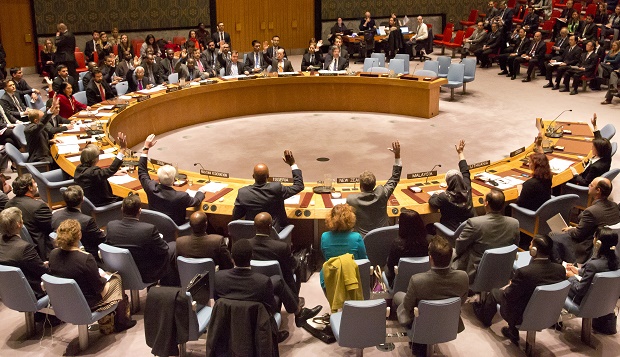UNITED NATIONS, United States—North Korea came under stinging criticism at the UN Security Council on Thursday for the second consecutive year for the unparalleled horrors of human rights violations that deny millions basic freedoms.
READ: UN council to meet Thursday on North Korea rights violations
The meeting, which fell deliberately on international human rights day, was chaired by the United States, which had joined eight other members in calling for the talks on Pyongyang’s dismal rights record.
Permanent members China and Russia opposed the meeting saying the council was not the appropriate forum, and denying that the human rights situation in North Korea posed a threat to international peace and security.
READ: Draft resolution asks UN to refer North Korea to Int’l Criminal Court
An attempt by China to prevent the talks was voted down, despite support from Angola, Russia and Venezuela.
US Ambassador Samantha Power tore strips off China and Russia’s position, saying that arguments “heard today will not go down well in history.”
The abuses are a “nightmare” and represent “a level of horror unrivaled in the world,” said the US ambassador.
READ: N. Korea human rights on UN Security Council agenda
Quoting from a report by the UN secretary general, she said tens of thousands of prisoners had for generations been gradually eliminated through deliberate starvation, forced labor, executions and infanticide.
“The list is long, the abuses vast and the anguish profound,” she said. A third of children under five, and almost half of those aged between 12 and 23 months are anemic, she added.
She shared the horrors endured by two people who escaped the regime and who stood up in the chamber, as she narrated the loss of their relatives, the starvation, imprisonment and torture they endured.
“We must continue to take steps that one day will help us to hold accountable the individuals responsible for the horrors like those experienced by our guests today,” she said.
UN human rights chief Zeid Ra’ad Al Hussein said Pyongyang must be referred to the International Criminal Court over the “scale and extreme gravity” of its human rights violations.
No parallel
He said he believed referring the country to the ICC was “essential, given the scale and extreme gravity of the allegations.”
The UN General Assembly has recommended the same course of action several times, but China—North Korea’s only major world ally—would likely block any such move with its veto power.
Millions of people are denied basic rights and freedoms, and between 80,000 and 120,000 are still being held in prison camps, the UN has said.
Prisoners, including children, have been deliberately starved, made to carry out forced labor, been subject to extrajudicial killings and summary executions, torture and rape.
“The gravity, scale and nature of violations reveal a State that does not have any parallel in the contemporary world,” Hussein said.
Food insecurity is an ongoing concern, women are subject to gender-based violence and discrimination, and international abductions was also of “very grave concern,” he said.
He welcomed signs that Pyongyang had made “some tentative efforts” to engage internationally and welcomed an invitation for him to visit.
“My office is now engaged with the authorities to explore modalities for a possible future visit,” he told the council.
Amnesty International called on the council to send an “unequivocal message to the North Korean authorities to end the systematic, widespread and gross human rights violations that continue to be committed.”
“The UN Security Council has a chance to show that the world has not forgotten about the victims of crimes against humanity that continue to be committed in North Korea, and that those responsible will face justice,” said Nicole Bjerler from Amnesty’s UN office in New York.
In late November, Pyongyang rejected a UN resolution on its human rights violations as a product of US hostility seeking to topple its regime.
The Security Council meeting came as North Korean leader Kim Jong-Un suggested that his state has developed a hydrogen bomb, a move that would mark a major step forward in its nuclear weapons capabilities—but which was met with international skepticism.
